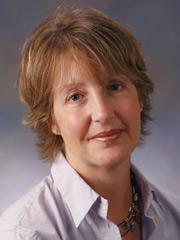Shawn M. Kneipp, ARNP, Ph.D.
Associate Professor of Nursing
College of Nursing
2007 Awardee
 The role that U.S. welfare policy may play in women’s health was entirely overlooked until the mid-1990s. To that point, studies focused on examining women’s earnings and employment stability after leaving welfare; their reasons for returning to welfare; and the effect of welfare programs on children’s well-being and development.
The role that U.S. welfare policy may play in women’s health was entirely overlooked until the mid-1990s. To that point, studies focused on examining women’s earnings and employment stability after leaving welfare; their reasons for returning to welfare; and the effect of welfare programs on children’s well-being and development. With her background in providing primary care to low-income women as a nurse practitioner, Shawn Kneipp changed that avenue of focus by concentrating on the intersection of welfare policy and women’s health. One of her early publications was a first in nursing literature to highlight the reasons why welfare policy should be a prevalent concern in nursing science research.
Since coming to UF in 1999, Kneipp has conducted three studies related to the changes in stress, mental health and physical health as women exit the welfare program and become employed. She is currently principal investigator of a $1.4 million NIH-funded study to test the efficacy of comprehensive health intervention for women leaving welfare for work. The only study of its kind in the country, Kneipp says, the project provides participants with access to a public health nurse for their health problems, 9-month intensive case management, and Medicaid education and skills training.
“Over the next five years, I hope to have data suggesting the intervention in our current study is effective in improving the health of low-income women, continue my research efforts on stress-related determinants of health disparities, and be a catalyst for making health-enhancing changes to public policies that overwhelmingly affect women,” she says.
“Dr. Kneipp has successfully incorporated the research-related knowledge she has obtained into her clinical practice with vulnerable and underserved populations,” says Jennifer H. Elder, chair of the Department of Health Care Environments and Systems. “Through this work Dr. Kneipp provides a clear demonstration of how it is possible to effectively close the gap between scientific inquiry and quality clinical practice.”

